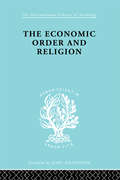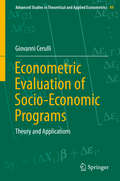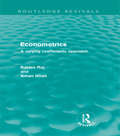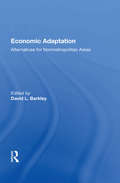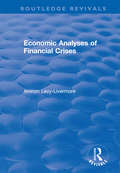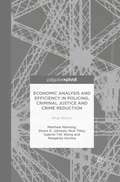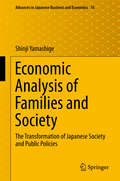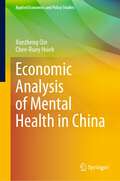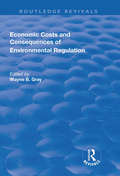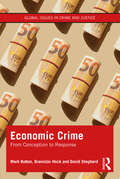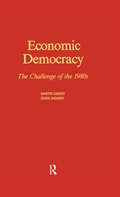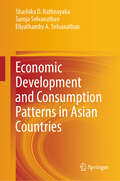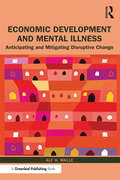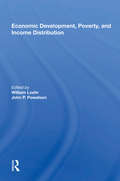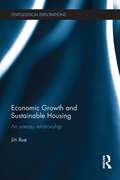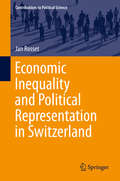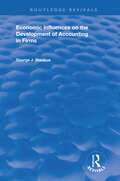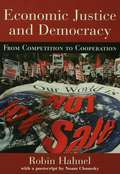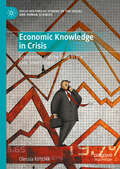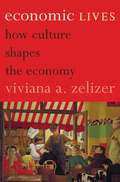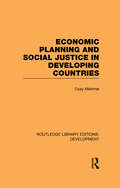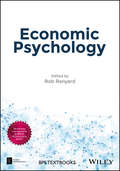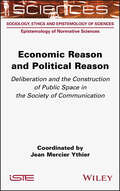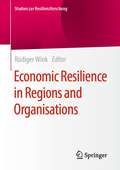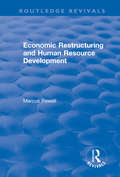- Table View
- List View
Econ Order & Religion Ils 76 (International Library of Sociology)
by Frank Knight Thornton W. MerriamFirst Published in 1998. Routledge is an imprint of Taylor & Francis, an informa company.
Econometric Evaluation of Socio-Economic Programs
by Giovanni CerulliThis book provides advanced theoretical and applied tools for the implementation of modern micro-econometric techniques in evidence-based program evaluation for the social sciences. The author presents a comprehensive toolbox for designing rigorous and effective ex-post program evaluation using the statistical software package Stata. For each method, a statistical presentation is developed, followed by a practical estimation of the treatment effects. By using both real and simulated data, readers will become familiar with evaluation techniques, such as regression-adjustment, matching, difference-in-differences, instrumental-variables and regression-discontinuity-design and are given practical guidelines for selecting and applying suitable methods for specific policy contexts.
Econometrics: A Varying Coefficents Approach (Advanced Texts In Econometrics Ser.)
by Baldev Raj Aman UllahOriginally published in 1981, this book considers one particular area of econometrics- the linear model- where significant recent advances have been made. It considers both single and multiequation models with varying co-efficients, explains the various theories and techniques connected with these and goes on to describe the various applications of the models. Whilst the detailed explanation of the models will interest primarily econometrics specialists, the implications of the advances outlined and the applications of the models will intrest a wide range of economists.
Economic Adaptation: Alternatives For Nonmetropolitan Areas
by David L BarkleyThis volume focuses on alternatives for non-metropolitan economic development in the new international economic climate. It provides critical reviews of popular employment-generation alternatives for rural areas.
Economic Analyses of Financial Crises (Routledge Revivals)
by Amnon Levy-LivermorePublished in 1995, this set of 13 essays on the causes and implications of financial problems in three different economic organizations - corporate, semi-co-operative and non-co-operative farming communities and sovereign states. Areas covered include insolvency and bankruptcy, and risk-sharing/spreading behaviour.
Economic Analysis and Efficiency in Policing, Criminal Justice and Crime Reduction: What Works?
by Shane D. Johnson Nick Tilley Matthew Manning Gabriel T.W. Wong Margarita VorsinaThis monograph explains what economic analysis is, why it is important, and forms it can take in policing and criminal justice. Costs are important in all forms of economic analysis but their collection tends to be partial and inadequate in capturing key information. A practical guide to the collection is therefore also provided.
Economic Analysis of Families and Society: The Transformation Of Japanese Society And Public Policies (Advances in Japanese Business and Economics #0)
by Shinji YamashigeThis book, based on economics andgame theory, analyzes the changes that Japan is now facing as a reflection ofchanges in Japanese families and society. The author presents a simpleframework for the structural relationship among markets, communities includingfamilies, and the state; and uses it to explain the changes that have occurredin Japanese society. Social changes have created a series of social problemssuch as population ageing, inequality, and regional disparities, which requirechanges in public policies. The book provides readers with rich informationabout the Japanese social security system, social policies and regionalpolicies by explaining why they are developed, how they are designed, and whatchallenges they face. Readers will find that the transformation of Japanesesociety is not really a special case but a fairly common one that manydeveloped countries have experienced and many developing countries are going toexperience. The book will be useful not only to those who are interested inJapanese society and public policies but also to anyone who is interested inthe transformations of families, communities, and roles of the state in amodern market economy.
Economic Analysis of Mental Health in China (Applied Economics and Policy Studies)
by Chee-Ruey Hsieh Xuezheng QinThis book uses an economic approach to analyze the socioeconomic causes and consequences of mental health disorders in China, with a special focus on mental depression. Based on a nationally representative dataset, we first investigate the prevalence and distribution of depression and depressive symptoms among China’s adult population, and then use several econometric methods to estimate the multi-dimensional disease burden of the mental disorder, such as its direct medical costs, its indirect economic costs, and its hidden costs on social trust and life satisfaction. In addition, we specifically address the socioeconomic determinants of mental health by examining how the relative and absolute economic status may determine people’s mental depression. Lastly, we propose an analytical framework to evaluate the four major hurdles that cause the treatment gaps of mental health care, and discuss the policy options to overcome such hurdles and to address the unmet mental healthcare needs in China and other developing countries. The book may facilitate our understanding on the complex determinants and implications of the rising prevalence of mental health disorders in developing countries like China. In addition to the students, teachers, and researchers in the fields of health economics and public health, the book may also be of interest to health policy makers and non-government agencies who are concerned with addressing the global mental healthcare challenges using economic policy tools.
Economic Costs and Consequences of Environmental Regulation (Routledge Revivals)
by Wayne B. GrayThis title was first published in 2002. How expensive is environmental regulation and how does it affect the economy? A proper understanding of the costs imposed by environmental regulation is important for policy-makers and others concerned with regulatory design. This book focuses on empirical studies of the impact of environmental regulation on the economy, exposing the reader to a variety of estimation methodologies and datasets that have been used in this area. Three basic sources provide information on the costs of environmental regulation: surveys; engineering studies; and econometric analysis. This text draws on all three in its investigation.
Economic Crime: From Conception to Response (Global Issues in Crime and Justice)
by Mark Button David Shepherd Branislav HockThis book is the first attempt to establish 'economic crime' as a new sub-discipline within criminology. Fraud, corruption, bribery, money laundering, price-fixing cartels and intellectual property crimes pursued typically for financial and professional gain, have devastating consequences for the prosperity of economic life. While most police forces in the UK and the USA have an ‘economic crime’ department, and many European bodies such as Europol use the term and develop strategies and structures to deal with it, it is yet to grain traction as a widely used term in the academic community. Economic Crime: From Conception to Response aims to change that and covers: definitions of the key premises of economic crime as the academic sub-discipline within criminology; an overview of the key research on each of the crimes associated with economic crime; public, private and global responses to economic crime across its different forms and sectors of the economy, both within the UK and globally. This book is an essential resource for students, academics and practitioners engaged with aspects of economic crime, as well as the related areas of financial crime, white-collar crime and crimes of the powerful.
Economic Democracy: The Challenge of the 1980's (Routledge Revivals Ser.)
by Martin Carnoy Derek ShearerThis text discusses the economic, social and political implications of redirecting labour and capital from a military-based to a post-Cold War economy.
Economic Development and Consumption Patterns in Asian Countries
by Eliyathamby A. Selvanathan Saroja Selvanathan Shashika D. RathnayakaThis book analyzes consumption patterns in Asian countries that are at different stages of economic development and highlights the similarities and disparities of consumption patterns across countries using a system-wide framework. In a departure from previous studies in the literature which mainly present only single-country analysis, this book aims to provide a comprehensive analysis of cross-country consumption patterns considering several Asian countries, using the most recent consumption expenditure data for aggregate commodity groups. In comparing consumption patterns across countries, the book use unit-free measurements such as budget shares and changes in logarithms of price and quantities, thus avoiding problems associated with exchange rate conversions. The book also analyses the dynamic behaviour in the consumption patterns of the Asian consumers. The findings of this book will be invaluable to researchers in development economics as well as policymakers in the formulation of fiscal policy or other types of economic control.
Economic Development and Mental Illness: Anticipating and Mitigating Disruptive Change
by Alf H. WalleSocial, economic, and technological changes disrupt many Indigenous, ethnic, and rural communities even when offering progress. Under these conditions, social and psychological dysfunctions are likely to emerge. This book provides insights regarding how to anticipate, prevent, and, when necessary, provide mitigation strategies to communities and individuals who suffer as a result. This book, the first of its kind, provides an overview of strategic and policy issues involving the relationship between change and dysfunction, enabling the reader to more effectively deal with potentially hurtful influences in proactive, equitable, and culturally sensitive ways. After providing a theoretical overview, methods for anticipating the hurtful impacts of change are discussed, along with techniques for mitigating its negative effects upon communities and individuals. Learning objectives and discussion questions are included with each chapter, and the book can serve as a text for courses on indigenous economic development, Native studies, culturally appropriate business, and culturally competent therapy. It can also be used as a professional handbook for practitioners working with communities affected by these issues.
Economic Development, Poverty, And Income Distribution
by John P. Powelson William LoehrThe increasing inequality and poverty that seem inevitably to accompany economic growth in developing countries have become more and more evident in recent years. The search for development paths that lead to growth with equality—all too difficult to find—is now an area of central concern for development economists. One result of their concern is this volume, in which internationally known representatives of a range of disciplines address themselves to ways in which growth with equity might be successfully achieved. The book begins with both empirical and theoretical background to the development issues involved, and with an overview of the experience of the international development assistance community. focuses on operational definitions of the poor that will permit analytical, policy-oriented research to lead to useful conclusions. Specific concern is expressed for small-business owners, women, peasants, and recent migrants from rural to urban areas. The basic question, of course, is what can be done about poverty and inequality. includes suggestions for specific measures and provides a comprehensive comparison across a wide range of policy options. The book does not solve the problem, but it does point to directions that promise a reasonably high probability of success. And throughout, suggestions are made for the kind of interdisciplinary research required to raise that probability even further.
Economic Growth and Sustainable Housing: an uneasy relationship (Ontological Explorations (routledge Critical Realism) Ser.)
by Jin XueEconomic Growth and Sustainable Housing: An Uneasy Relationship critically discusses the possibilities of decoupling environmental degradation from economic growth. The author refutes the belief in combining perpetual economic growth with long-term environmental sustainability based on the premise that economic growth can be fully decoupled from negative environmental impacts. This proposition is underpinned by intensive study in the housing sector from both theoretical and empirical perspectives. Xue employs critical realism to inform the investigation and organize the argumentation throughout the book. The book is organised into four parts: the first discusses the relevance of critical realism to the research field of housing and urban sustainable development in terms of ontology and methodology. The second makes a transcendental refutation of the possibilities of decoupling economic growth from housing-related environmental impacts by describing transfactual conditions of full decoupling. The third part presents two case studies to show whether and to what extents decoupling between economic growth and housing-related environmental impacts have historically taken place. Inspired by critical realist ontology, generalization of abstract concept from the case studies are made to cast light on the implausibility of maintaining perpetual economic growth through decoupling. The final part explains why and how the belief in full decoupling and economic growth is generated and sustained despite its implausibility and non-necessity, which constitutes an explanatory critique of the growth and decoupling ideology and paves the way for the paradigm shift to socially sustainable de-growth. This book will be of interest to students of housing and urban studies, to students of environmental sustainability and also for those students and academics with a general interest in critical realism.
Economic Inequality and Political Representation in Switzerland
by Jan RossetThis book analyzes the link between economic and political inequalities and investigates the mechanisms that lead to economically rooted inequalities in the political representation of citizens' policy preferences. Focusing on the case of Switzerland and evaluating data from the post-electoral survey, Selects 2007, the author demonstrates that the policy preferences of members of the Federal Assembly best reflect those of rich citizens. This pattern is explained by differential levels of political participation and knowledge across income groups, party finance, the fact that representatives tend to come from higher economic strata, and the failure of the party-system structure to reflect the complexity of policy preferences among citizens.
Economic Influences on the Development of Accounting in Firms (Routledge Revivals Ser.)
by George J. StaubusFirst published in 1996. This volume explores firm accounting and its development to measure and report the effects of economic events on a firm or business. The purpose of this text is to stimulate interest in explaining the development of specific features of accounting in the firms that are important to the economies of Western industrialised countries by reference to the economic features of those firms.
Economic Justice and Democracy: From Competition to Cooperation (Pathways Through The Twenty-first Century Ser.)
by Robin HahnelIn Economic Justice and Democracy, Robin Hahnel puts aside most economic theories from the left and the right (from central planning to unbridled corporate enterprise) as undemocratic, and instead outlines a plan for restructuring the relationship between markets and governments according to effects, rather than contributions. This idea is simple, provocative, and turns most arguments on their heads: those most affected by a decision get to make it. It's uncomplicated, unquestionably American in its freedom-reinforcement, and essentially what anti-globalization protestors are asking for. Companies would be more accountable to their consumers, polluters to nearby homeowners, would-be factory closers to factory town inhabitants. Sometimes what's good for General Motors is bad for America, which is why we have regulations in the first place. Though participatory economics, as Robert Heilbronner termed has been discussed more outside America than in it, Hahnel has followed discussions elsewhere and also presents many of the arguments for and against this system and ways to put it in place.
Economic Knowledge in Crisis: Economists and the State in the Late Soviet Union (Socio-Historical Studies of the Social and Human Sciences)
by Olessia KirtchikThis book aims to shed new light on the puzzle of the late Soviet conversion to the “market” and capitalism by revisiting the history of Soviet reform economics. Using a variety of sources, including interviews with economists, archival files, and published materials, it examines the social contexts in which economists employed in economic administration and research institutions could have played a crucial public and political role, the forms of their participation, and the social and political logic behind the selection of economic experts and their rise to power during perestroika and the “transition” period. It also compares the professional trajectories of these reformist economists and assesses the scope of this group’s influence in the post-Soviet period in order to conclude on the new state of economic expertise in Russia.
Economic Lives: How Culture Shapes the Economy
by Viviana A. ZelizerRevealing the human side of economic lifeOver the past three decades, economic sociology has been revealing how culture shapes economic life even while economic facts affect social relationships. This work has transformed the field into a flourishing and increasingly influential discipline. No one has played a greater role in this development than Viviana Zelizer, one of the world's leading sociologists. Economic Lives synthesizes and extends her most important work to date, demonstrating the full breadth and range of her field-defining contributions in a single volume for the first time.Economic Lives shows how shared cultural understandings and interpersonal relations shape everyday economic activities. Far from being simple responses to narrow individual incentives and preferences, economic actions emerge, persist, and are transformed by our relations to others. Distilling three decades of research, the book offers a distinctive vision of economic activity that brings out the hidden meanings and social actions behind the supposedly impersonal worlds of production, consumption, and asset transfer. Economic Lives ranges broadly from life insurance marketing, corporate ethics, household budgets, and migrant remittances to caring labor, workplace romance, baby markets, and payments for sex. These examples demonstrate an alternative approach to explaining how we manage economic activity—as well as a different way of understanding why conventional economic theory has proved incapable of predicting or responding to recent economic crises.Providing an important perspective on the recent past and possible futures of a growing field, Economic Lives promises to be widely read and discussed.
Economic Planning and Social Justice in Developing Countries
by Ozay MehmetFirst published in 1978, this book was written at a time when belief was high in Western-guided economic development of the emerging countries. The success of Marshall Plan in war-torn Europe generated a US-led optimism that, with generous inflows of aid and technical assistance, the Third World could be won over in the Cold War. The author’s direct experience as a young academic economist in Cyprus, Malaysia, Uganda and Liberia led him to question this general optimism: the reality on the ground in the developing world did not seem to match Western optimism. Theories and blueprints, made in the West, did not fit the requirements of developing countries. Higher production and better income distribution were inseparable twin objectives of developing nations. That meant, production of a higher national output must at the same time promote social justice. Investment must create adequate jobs so that new entrants into rapidly expanding labor force could be gainfully employed. Yet, the dominant (Western) theories of development at the time, in particular the Trickle Down Theory of Growth, prescribed "Growth First, Distribution Later" strategy. Similarly, Import Substitution Industrialization theories were emphasized at the expense of export-led growth. Dualistic Growth theories preached urban-biased, anti-rural development. This book was written as a rebuttal of such faulty theorizing and misguided professional technical assistance and the book’s message is no less valid today than in the 1970’s.
Economic Psychology
by Rob RanyardA comprehensive overview of contemporary economic psychology Economic Psychology presents an accessible overview of contemporary economic psychology. The science of economic mental life and behavior is increasingly relevant as people are expected to take more responsibility for their household and personal economic decisions. The text will, in addition to reviewing current knowledge on each topic presented, consider the practical and policy implications for supporting economic decision making. Economic Psychology examines the central aspects of adult decision making in everyday life and includes the theories of economic decision making based on risk, value and affect, and theories of intertemporal choice. The text reviews the nature and behavioral consequences of economic mental representations about such things as material possessions, money and the economy. The editor Robert Ranyard—a noted expert on economic psychology—presents a life-span developmental approach, from childhood to old age. He also reviews the important societal issues such as charitable giving and economic sustainability. This vital resource: Reviews the economic psychology in everyday life including financial behaviour such as saving and tax-paying and matters such as entrepreneurial activity Offers an introduction to the field and traces the emergence of the discipline, from Adam Smith to George Katona and Herbert Simon Includes information on societal issues such as charitable giving and pro-environmental behaviour Considers broader perspectives on economic psychology: life-span psychological development from childhood to old age Written for students of psychology, Economic Psychology reviews the most important information on contemporary economic psychology with a focus on individual and household economic decision making, ranging widely across financial matters such as borrowing and saving, and economic activities such as buying, trading, and working.
Economic Reason and Political Reason: Deliberation and the Construction of Public Space in the Society of Communication
by Jean Mercier YthierThe public space of democracies is constructed in a context that is marked by the digital transformation of the economy and society. This construction is carried out primarily through deliberation. Deliberation informs and guides both individual and collective action. <p><p> To shed light on the concept of deliberation, it is important to consider the rationality of choice; but what type of rationality is this? References to economic reason are at once widespread, crucial and controversial. This book therefore deals with arguments used by individuals based on the notions of preferential choice and rational behavior, and also criticizes them. These arguments are examined in the context of the major themes of public debate that help to construct the contemporary public space: "populism", social insurance, social responsibility and environmental issues. <p><p> Economic Reason and Political Reason underlines the importance of the pragmatist shift of the 2000s and revisits, through the lens of this new approach, the great utilitarian and Rawlsian normative constructs that dominated normative political economics at the end of the 20th century. Alternative approaches, based on the concept of deliberative democracy, are proposed and discussed.
Economic Resilience in Regions and Organisations (Studien zur Resilienzforschung)
by Rüdiger WinkLeading researchers on economic resilience from economic geography, economic history and organizational studies discuss recent approaches to better understand the impact of structures, processes, agency, governance and multilevel settings on economic resilience.
Economic Restructuring and Human Resource Development
by Marcus Powell Maragret BlackThis title was first published in 2003. An analysis of education and training issues from the perspective of a planner, this book is the culmination of three years' research stemming from a concern by governments over how they can manage change and what contribution education and training policies play in this.
